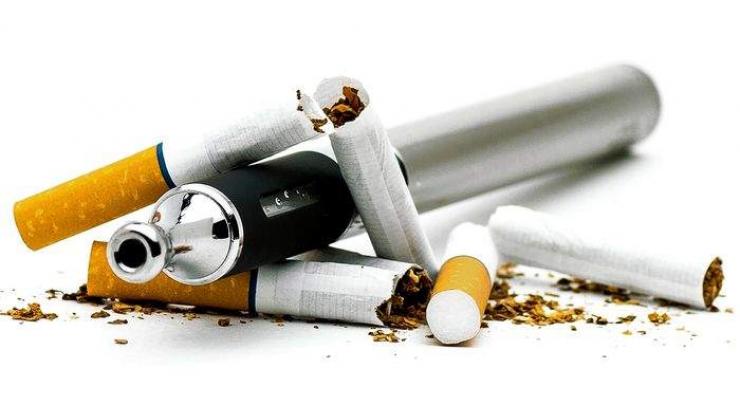
PIMA Seeks Raise In Taxation On Cigarettes, Tobacco Bi-products
Rukhshan Mir (@rukhshanmir) Published May 24, 2017 | 08:55 PM

KARACHI, May. 24 (UrduPoint / Pakistan Point News - 24th May, 2017 ) : Pakistan Islamic Medical Association (PIMA), comprising doctors from across the country, have recommended raise in the taxation rates for cigarettes and other hazardous bi- products of tobacco in the national as well as provincial budgets for 2017-2018.
PIMA President, Dr Abdul Malik in a press conference Wednesday said country with no less than 100,000 deaths caused due to smoking and oral consumption of tobacco needed a stringent and persistent policy to protect precious human lives.
In reply to a question he said growing incidence of lung and oral cancers, strokes, heart and respiratory diseases are all directly linked to tobacco consumption in one or the other form. Dr. Abdul Malik, a seasoned neurologist, said national and international research has well established that any increase in tobacco price leads to a decrease in number of smoker.
"This is in-fact one of the most effective strategies to curb tobacco use among general population," he said. Mentioning that the strategy hold absolute relevance to Pakistan, PIMA president said ours is one of the largest populations of tobacco users in the world.
There are over 22 million adults smoking cigarettes, huqqa or biri and millions more using smokeless tobacco products, including gutka, naswar, and paan.
"One-third or 32.4% of our male population and 5.7% of women smoke tobacco," he said.
Responding to another query, he said rise in the cost of cigarettes and other bi-products of tobacco, consequent to high taxation, may not matter for the richer strata of the society, however, for the poor and lower middle class, even a small price rise matters a lot.
It is this group that is furthermost away from any sort of health education, health care and economic benefits when it comes to illness that inevitably stems from tobacco use, said the seasoned doctor.
He on the occasion also shared a recent data, based on a research study conducted jointly by FBR, World Bank, University of Toronto, Johns Hopkins University, University of Illinois at Chicago and the Beacon house National University.
The study based on tobacco taxation in Pakistan concluded that a uniform specific excise tax of Rs. 31.2 per pack of 20 cigarettes, could reduce overall cigarette consumption by 7.5 per cent, increase tax revenues by Rs 27.2 billion, leading to over half a million users quitting and reducing premature deaths among current adult smokers by over 180,000, while also preventing 725,000 youth from taking up smoking.
Related Topics
Recent Stories

Meter tampering, gas theft main reasons behind over billing in Balochistan: Tara ..

JUI-F chief expresses concerns about state of democracy in Pakistan

Four terrorists involved in suicide attack on Chinese in Besham arrested

SIC chief asks PTI leaders to resign from assemblies

Pakistan working tirelessly to eradicate polio from country: PM

IHC Justice Sattar dismisses pleas moved by FIA, PEMRA and PTA in audio leaks ca ..

Gillespie, Kirsten feature in 48th edition of PCB Podcast

Security forces kill four terrorists in Tank

Fake immoral video of Ducky Bhai's wife goes on viral on social media

Currency Rate In Pakistan - Dollar, Euro, Pound, Riyal Rates On 29 April 2024

Today Gold Rate in Pakistan 29 April 2024

Currency Rate In Pakistan - Dollar, Euro, Pound, Riyal Rates On 28 April 2024
More Stories From Pakistan
-
Youth dies in Tanker-Rickshaw collision
6 seconds ago -
Punjab govt in touch with real representatives of farmers: Azma Bukhari
9 minutes ago -
Funds allocated for repair, maintenance of Chakdara-Upper Dir road
9 minutes ago -
Young man found dead a day after killing teenage girl, DPO seeks report
10 minutes ago -
SNGPL disconnects 612 meters on gas theft
10 minutes ago -
Conference on 'Pure and Applied Mathematics' kicks off
10 minutes ago
-

Meter tampering, gas theft main reasons behind over billing in Balochistan: Tarar
10 minutes ago -
President urges steps to promote local businesses for GB’s self-sufficiency
10 minutes ago -
Brother, sister jump into river, girl saved
10 minutes ago -
International workshop on "Gemstones" held at UET
10 minutes ago -

JUI-F chief expresses concerns about state of democracy in Pakistan
16 minutes ago -
Sindh Minister orders urgent action to address facilities shortage in district Matiari
19 minutes ago

